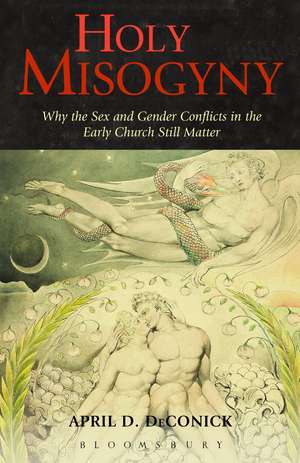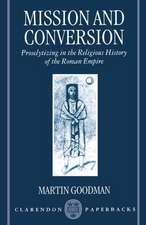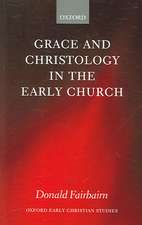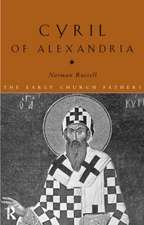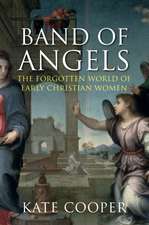Holy Misogyny: Why the Sex and Gender Conflicts in the Early Church Still Matter
Autor April D. DeConicken Limba Engleză Paperback – 6 noi 2013
Preț: 102.34 lei
Preț vechi: 168.60 lei
-39% Nou
Puncte Express: 154
Preț estimativ în valută:
19.58€ • 20.94$ • 16.33£
19.58€ • 20.94$ • 16.33£
Carte tipărită la comandă
Livrare economică 18 aprilie-02 mai
Preluare comenzi: 021 569.72.76
Specificații
ISBN-13: 9781623565565
ISBN-10: 1623565561
Pagini: 200
Ilustrații: 12
Dimensiuni: 137 x 213 x 15 mm
Greutate: 0.27 kg
Ediția:Revised
Editura: Bloomsbury Publishing
Colecția Bloomsbury Academic
Locul publicării:New York, United States
ISBN-10: 1623565561
Pagini: 200
Ilustrații: 12
Dimensiuni: 137 x 213 x 15 mm
Greutate: 0.27 kg
Ediția:Revised
Editura: Bloomsbury Publishing
Colecția Bloomsbury Academic
Locul publicării:New York, United States
Caracteristici
April's first trade book, The Thirteenth Apostle, made a genuinely important contribution to the field. Her position in that book, initially controversial, is now fast becoming the consensus.
Notă biografică
April D. DeConick is the Isla Carroll and Percy E. Turner Professor of Biblical Studies and Chair of the Department of Religious Studies at Rice University, USA. She is the author of numerous books onearly Christian history, including The Thirteenth Apostle: What the Gospel of Judas Really Says.
Cuprins
Introduction: A Lady God?Chapter 1. Where did God the Mother Go?The Jewish SpiritThe Angel SophiaA Hebrew GoddessThe Recovery of God's WifeChapter 2.Why was the Spirit Neutered?Introducing Jesus' True MotherCarried up Mount TaborIn the Name of the Mother SpiritBorn from the Womb of WaterMilking the Breasts of GodThe Mother's ErasureGod's Gender CrisisChapter 3.Did Jesus Think Sex is a Sin?A Double MessageSex LimitsSex According to JesusA Women's Advocate Chapter 4.Did Paul Hate Women?The Burgeoning of ChastityTo Veil or Not to VeilVanishing WomenChapter 5.Is Marriage a Sin?Rereading GenesisThe Devil Made Me Do tIIn Defiance of the CreatorIt's the End of the WorldChapter 6.Is Marriage Salvation?Sacred SexThe Law is a JokeSoul CollectorsChapter 7.Once a Woman, Always a Woman?The Church is a HouseholdBrides of ChristThe Devil's GatewayChapter 8.How do we Solve a Problem Like Maria?Mary Caught in the CrossfireThe Male MaryThe Sexual MaryThe Apostolic MaryChapter 9.Because the Bible Tells Us So?Further ReadingNotes
Recenzii
In this compelling book April D. DeConick applies her characteristic interest in marginalized early Christian groups to a topic that has drawn considerable scholarly attention in the past several decades: the study of women, sex, and gender in early Christianity. Holy Misogyny is an accessible and imaginative historical reconstruction of the textual and extratextual conflicts behind early Christian displacement of both 'the female aspect' of deity and women's bodies, identity, and authority.
In this lucid and logically arranged book, April D. DeConick, professor of Religious Studies at Rice University, makes a presentation of the ways in which women appear or don't appear in the ancient religious record ... DeConick canvasses a broad range of sources and presents complexities that will interest advanced readers and provoke reflection among them ... The relevance of this book to questions of religion and gender is unquestionable.
'[This book] is a superbly researched 200-page compendium by [the author] presenting the origins of such Christian doctrinal issues as to why God is male, the association of women with sin, the denial of priesthood to females, and more. Informed and informative, thoughtful and thought-provoking [this book] is a strongly recommended read for anyone concerned with the origin of gender equality issues within the contemporary Christian community.'-The Midwest Book Review
'The book is academically rigorous, but at every point DeConick interprets her data in the light of her intended conclusion...This volume is suitable for libraries at the intersection of women's studies, the history of Christianity, and theology.'-Choice: Current Reviews for Academic Libraries
'Despite the fact that the subject is well-known, almost cliché in certain circles, DeConick brings some new information and insights to the table in her analysis...The most important anthropological message in her eye-opening work is that every tradition, including its scriptures (which claim the greatest authenticity and authoritativeness) is diverse and historically constructed...'
April DeConick has collected materials from a wide range of early Christian evidence. The result is a brave book, in a straight-forward style accessible to a non-specialist audience, on an uncomfortable subject.
An intriguing, important, and appropriately dangerous book. DeConick brings her study of the difficult canonical and apocryphal texts into conversation with contemporary concerns in a satisfying and accessible way. Her style is both technical and easy-going. This is a book for the general public as well as the academic classroom. I learned a great deal from it and am left with many questions to chew on happily and to discuss. The reader is aided in the search for 'Lady God,' and in the struggle to create societies that abhor and reject violence to the female body.
April DeConick, a world class scholar, has written a must-read book for those interested in gender issues in relationship to God. By integrating her vast knowledge of extra-canonical and canonical texts, she expansively analyzes the effect of misogyny on conceptions of the female body and the profound difference such marginalization has made, even today for women's ecclesiastical leadership and ordination.
The near-programmatic downgrading and degrading of women is one of the most shameful aspects of traditional Christianity. In this powerful book, DeConick rejects conventional theological and hermeneutical attempts to soften the absence of the divine and human female by challenging head-on the vilification of women and the othering of their bodies in early Christianity. This bold discussion makes for uncomfortable but essential reading - and rightly so.
DeConick's research traces the root of the problem beyond he usual interpretations of scripture, theology, and the social structures of the times to something deeper and much more perverse...
Though DeConick is a scholar and this book the fruit of her scholarship, her writing is remarkable accessible for lay audiences, and even quite humorous. Holy Misogyny is an invaluable resource for those looking to find the historical roots of the ongoing struggle for women's equality in the Christian tradition. --Jamie L. Manson
DeConick... has done a wonderful service for all readers interested in the history of women in the early church and provides a helpful, if at times painful, analysis of why the fight for equality in the church is so challenging.
Overall, DeConick has a lot of interesting things to say about gender and sexuality in the early church... I do think her account is appropriately dangerous, and can hopefully jar Christians into action to reverse the long tradition of misogynistic interpretation of Scripture and misogynistic action in the Church.
Highly recommended for readers willing to look at recent archaeological evidence to question traditional religious beliefs and conclusions.
This book may be singled out as a model of a popular though, at the same time,sound scholarly work. Its author, well known for her leading contributions to the study of early Christianity, outlines the story of women in the early church . In nine chapters the story is told with an impressive command of the original sources ... A book like this deserves a wide circulation.
In this lucid and logically arranged book, April D. DeConick, professor of Religious Studies at Rice University, makes a presentation of the ways in which women appear or don't appear in the ancient religious record ... DeConick canvasses a broad range of sources and presents complexities that will interest advanced readers and provoke reflection among them ... The relevance of this book to questions of religion and gender is unquestionable.
'[This book] is a superbly researched 200-page compendium by [the author] presenting the origins of such Christian doctrinal issues as to why God is male, the association of women with sin, the denial of priesthood to females, and more. Informed and informative, thoughtful and thought-provoking [this book] is a strongly recommended read for anyone concerned with the origin of gender equality issues within the contemporary Christian community.'-The Midwest Book Review
'The book is academically rigorous, but at every point DeConick interprets her data in the light of her intended conclusion...This volume is suitable for libraries at the intersection of women's studies, the history of Christianity, and theology.'-Choice: Current Reviews for Academic Libraries
'Despite the fact that the subject is well-known, almost cliché in certain circles, DeConick brings some new information and insights to the table in her analysis...The most important anthropological message in her eye-opening work is that every tradition, including its scriptures (which claim the greatest authenticity and authoritativeness) is diverse and historically constructed...'
April DeConick has collected materials from a wide range of early Christian evidence. The result is a brave book, in a straight-forward style accessible to a non-specialist audience, on an uncomfortable subject.
An intriguing, important, and appropriately dangerous book. DeConick brings her study of the difficult canonical and apocryphal texts into conversation with contemporary concerns in a satisfying and accessible way. Her style is both technical and easy-going. This is a book for the general public as well as the academic classroom. I learned a great deal from it and am left with many questions to chew on happily and to discuss. The reader is aided in the search for 'Lady God,' and in the struggle to create societies that abhor and reject violence to the female body.
April DeConick, a world class scholar, has written a must-read book for those interested in gender issues in relationship to God. By integrating her vast knowledge of extra-canonical and canonical texts, she expansively analyzes the effect of misogyny on conceptions of the female body and the profound difference such marginalization has made, even today for women's ecclesiastical leadership and ordination.
The near-programmatic downgrading and degrading of women is one of the most shameful aspects of traditional Christianity. In this powerful book, DeConick rejects conventional theological and hermeneutical attempts to soften the absence of the divine and human female by challenging head-on the vilification of women and the othering of their bodies in early Christianity. This bold discussion makes for uncomfortable but essential reading - and rightly so.
DeConick's research traces the root of the problem beyond he usual interpretations of scripture, theology, and the social structures of the times to something deeper and much more perverse...
Though DeConick is a scholar and this book the fruit of her scholarship, her writing is remarkable accessible for lay audiences, and even quite humorous. Holy Misogyny is an invaluable resource for those looking to find the historical roots of the ongoing struggle for women's equality in the Christian tradition. --Jamie L. Manson
DeConick... has done a wonderful service for all readers interested in the history of women in the early church and provides a helpful, if at times painful, analysis of why the fight for equality in the church is so challenging.
Overall, DeConick has a lot of interesting things to say about gender and sexuality in the early church... I do think her account is appropriately dangerous, and can hopefully jar Christians into action to reverse the long tradition of misogynistic interpretation of Scripture and misogynistic action in the Church.
Highly recommended for readers willing to look at recent archaeological evidence to question traditional religious beliefs and conclusions.
This book may be singled out as a model of a popular though, at the same time,sound scholarly work. Its author, well known for her leading contributions to the study of early Christianity, outlines the story of women in the early church . In nine chapters the story is told with an impressive command of the original sources ... A book like this deserves a wide circulation.
